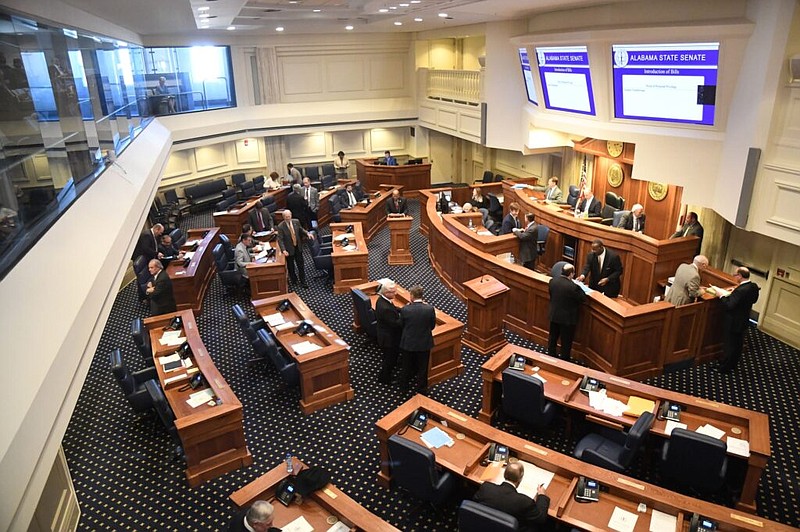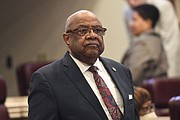When it started in the Alabama House of Representatives earlier this year, a package of gambling bills would have created a lottery; allowed casino gambling and sports betting, and directed Gov. Kay Ivey to negotiate a compact with the Poarch Band of Creek Indians, a federally recognized tribe that operates casinos in Atmore, Montgomery and Wetumpka.
When the legislation came out of the Senate, it had been stripped down to a lottery and compact bill with some historic horse betting allowed in certain casinos.
And as lawmakers return to start the second half of the 2024 regular session, they don't know where it's headed next.
"In the House, we decided to allow everybody to catch their breath and get their feet back underneath them because it's been such a frenzy of the first half of the legislative session," said Rep. Chris Blackshear, R-Smiths Station, who sponsored the bill in the House.
Echoing previous attempts to pass gambling legislation in Alabama, bills have passed one chamber but have stalled in another. In a reversal of previous years, the bills started in the House of Representatives and been torn apart in the Senate. The bills were not sent to the House before spring break began last week, Blackshear said.
(READ MORE: It's March Madness and more people than ever can legally bet on basketball games)
At the start of the session, the House of Representatives focused almost exclusively on the gambling legislation until it passed Feb. 15.
But the package lingered in the Senate where it sat quietly for weeks. The legislation eventually left a Senate committee in a drastically different shape than it entered the Senate. It passed the Senate on March 8 after a tense session where Albritton began filibustering the bill he was carrying.
The House can concur in the changes or send the bill to the conference committee, where a joint-chamber committee will find something workable for both sides.
Lawmakers said in interviews last week they did not know when that was going to happen.
Albritton said there was not so much a specific item in the House version of the bill that caused issues, as much as it was the entire bill.
"The whole bill was a poison pill according to the Senate," he said.
Sen. Arthur Orr, R-Decatur, who voted against the bill in the Senate, said he had concerns about "the expansion of legitimacy" for gambling. He cited "media" gambling in Lowndes County, a term he said was confusing to lawyers. He also had doubts about a specific type of machine in Houston County, which mimics the look of a slot machine, while having a paper bingo constitutional amendment.
Sen. Sam Givhan, R-Huntsville, a vocal opponent of the House-passed gambling bill, wrote in an email that he did not have a clue what could happen with the legislation.
"All I know is that there are not close to enough votes in the Senate to pass a 'comprehensive gaming bill,'" he wrote.
Sen. Chris Elliott, R-Josephine, had been a vocal opponent of the legislation on social media leading up to the vote but ultimately voted yes.
"I have always maintained that I wanted the people to have the right to vote for a lottery and that and I have been consistent on that and that is essentially what we have here," he said.
Elliott said that negotiations between the House and Senate leadership "gets above my pay grade real quick," but he does not think there's a lot of room for negotiation in the Senate.
"A lot of folks talk about leaving money on the table as it pertains to gambling, or leaving money on the table as it pertains to sports betting, and my answer to that is 'Yes,' and I'm okay with that because that's how you control the growth of government. You don't continue to give it more money," he said.
First since 2021
This year's attempts at passing the bill are the closest the Legislature has been to passing gambling since a bill in 2021, when then-Sens. Del Marsh, R-Anniston and Jim McClendon, R-Springville, tried to tackle the issue.
But Elliott said the 2024 bills are vastly different from the 2021 bills, with the 2021 bills putting much of the regulation and distribution in the constitutional amendment, while the House package put it in the enabling legislation.
It takes a three-fifths vote in the Legislature and voter approval to change the constitution, while the Legislature can change general law far more easily.
Elliott also said the issue this year lacks a figure like Marsh, who in 2021 was a former Senate President Pro Tem who had helped elect many of his colleagues. He also said some senators had left, which makes a big difference when trying to pass a constitutional amendment in the Senate.
"It is politics to some extent," Elliott said.
(READ MORE: Alabama Senate Republicans appear divided over gambling bill)
Marsh said in a phone interview Monday that in 2021 they realized they were losing money to other states. He said the challenges were deciding where revenue went and where the facilities were going.
"Once we kind of hammered that out, I'll be quite honest it wasn't, in my opinion, that difficult to pass out the Senate," he said.
Marsh's 2021 bill failed on a procedural motion. Later in the session, the Senate passed a bill sponsored by McClendon that was altered to be nearly identical to Marsh's.
McClendon said Monday that passing the bill out of the Senate was not that difficult because they knew who the no votes were after Marsh's bill failed to pass.
"So, I'd have to agree with him the second time around," he said.
McClendon said the people wanted a lottery. In the House, the legislation came up near the end of the session, when a group of Republicans attempted to turn it into a lottery-only bill. Amid confusion, the legislation failed to come to a vote.
Democratic support
To get enough votes to pass, the bill likely needs the support of House Democrats, who provided the votes to pass the legislation in February. The Republican caucus was divided.
House Minority Leader Anthony Daniels, D-Huntsville, has maintained through the session that he wanted language around a rural health program, which resembled Medicaid expansion, to stay in the bill. The Senate stripped the language out.
Daniels said last week he also needed to see a cost of living adjustment for retired educators to be in the bill for it to have his support in addition to the rural health language.
Rep. Sam Jones, D-Mobile, the main House Democrat working on the legislation, said last week they are planning to discuss next steps when they return to Montgomery, and they are still going through it.
"It's almost a rewrite of the entire legislation," he said.
(READ MORE: Tennessee sports betting grows, tops $500 million for first time)
Jones said he was still going through the legislation, but he does not think he would support the bill as it passed the Senate.
Albritton said he does not see a compromise or a willingness to compromise. But he said that while a way toward passage is unclear, it doesn't mean there isn't one.
"Never underestimate the Legislature to pull victory out of defeat or defeat from victory one or the other, we can do both usually, (and) simultaneously," he said.
Read more at AlabamaReflector.com.

